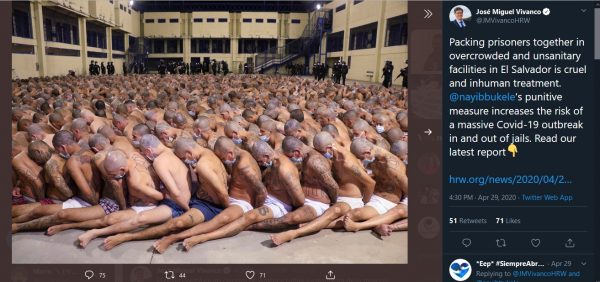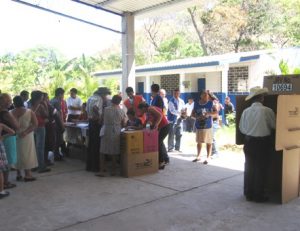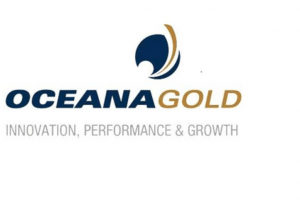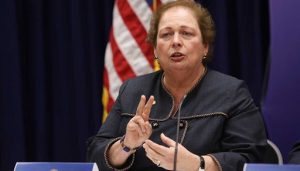Human Rights, International Meddling, Migration, Protecting Sovereignty
U.S State Department’s assessment of El Salvador
El Diario de Hoy had access to a U.S. State Department report that certifies that El Salvador is subject to receive cooperation from the United States for meeting certain criteria. However, it makes harsh accusations to the Nayib Bukele government for weakening democracy, the rule of law and institutionality.
“The administration of the President of the United States, Donald Trump, and his ambassador in El Salvador, Ronald Johnson, have shown a friendly tone with Salvadoran President Nayib Bukele’s administration, who has seen Washington as a powerful ally, despite acts that have weakened the rule of law and calls for rectification that have been made by many US legislators, mostly from the opposition.
However, this State Department document shows that the Trump administration does identify possible harm to institutions, as well as an attitude of little transparency and disdain for criticism”.
Here’s a small sample of the document with all its criteria (Read it all here):
Combating corruption and impunity, including prosecuting corrupt government officials
At the direction of President Bukele, on July 29, 2019, the Court of Accounts began auditing the “reserved spending account” for state intelligence funding of the Sanchez Ceren administration -totaling $183.8 million from 2014-2019. Former Presidents Saca and Funes misused the account to divert and misappropriate public funds.
Finances and salaries in the current 2020 budget are far from being clear: https://twitter.com/ElManagerChef/status/1263397562217828352
“Like many a caudillo, Mr Bukele entrusts power mainly to members of his family. His wife, Gabriela, picked much of the cabinet. Mr Bukele’s uncle is commerce secretary. The father of his godson runs the export-promotion agency. Childhood friends control the port authority and the agriculture ministry. In March Mr Bukele’s party elected a new president—his cousin.
People who deal with his government say his most influential associates are his brothers: Karim, Ibrajim and Yusef. Some observers see Nayib as a budding dictator. But his presidency is more a “corporatist family project” to establish the Bukeles as one of the country’s most powerful clans, says an economist”. (ECONOMIST)
Implementing reforms, policies, and programs to increase transparency and strengthen public institutions
(About 9F) at the time President Bukele believed his actions were justified based on the advice of his legal counsel, his subsequent acquiescence to the ruling of the Supreme Court prohibiting further such actions demonstrated the independence of the judicial branch, the rule of law, and could be interpreted as reaffirming the foundation of the country’s democratic system of government. However, the incident also suggests that absent the judicial decision President Bukele would have further undermined a public institution.
…when the Supreme Court issued a ruling that President Bukele needed approval from the Legislative Assembly to enforce his emergency executive order requiring Salvadorans to stay at home, President Bukele asserted the Supreme Court did not have the authority to decide on the issue due to the state of emergency. Bukele’s assertion was seen by many as an effort to weaken, rather than strengthen, public institutions. His recent actions on Twitter to block a reputable human rights NGO (José Miguel Vivanco, from Human Rights Watch) from following him in order to limit the NGO’s critical commentary of the government’s COVID-19 response reinforces the critique from some civil society members that the government is not promoting a transparent exchange of views on COVID-19 policy.
One example of positive government action is that on June 13, 2019, the Institute for Access to Public Information (IAIP), a government agency designed to fight corruption, affirmed that the daily working agendas of legislators are public information. The IAIP received a budget increase in 2019 from $1.4 million up to $1.9 million.
As we reported before, the Institute was sending information directly to the Presidential House. When this was revealed, the institute’s president later resigned.
In August 2019, President Bukele eliminated the so-called “secret presidential account” (partida secreta in Spanish) used by previous two presidents (Sanchez Ceren and Funes) to funnel many millions of dollars to political cronies. The office of the Attorney General also launched investigations into funds distributed from this account by the previous administrations. This is a highly commendable step given the indictment of three recent presidents for corruption and misappropriation of millions of dollars.
As we reported before, “Five parties of the emergency committee, selected by the Congressional Assembly to monitor the spending of $2 billion dollars, have renounced their positions and are claiming that the government is not being transparent in its spending to combat the pandemic.” (El Faro)
Protecting the rights of civil society, opposition political parties, and the independence of the media
Meanwhile, government efforts to silence media outlets and journalists if they do not support the government’s official narrative continue. Journalists critical of government policy face threats, many of which are fueled by Bukele’s treatment of them on social media. These efforts, which include selectively choosing to pull advertising from media outlets critical of its policies in order to shape content, undermine the healthy and open exchange of views that freedom of the press allows and does not promote independence of the media. Despite these concerns, we assess that, overall, the central government of El Salvador is meeting this criterion.
Bukele’s attacks to critics on social media and his involvement in cloning a newspaper’s site are well documented (A) (B).
Providing effective and accountable law enforcement and security for its citizens, and upholding due process of law
… This action demonstrates (the government)’s commitment to investigate and prosecute extrajudicial killings. Violent confrontations between police and alleged gang members are down almost 50 percent, and the number of alleged extrajudicial killings has decreased. El Salvador was ranked Tier 2 in the 2019 Trafficking in Persons Report because it demonstrated increasing efforts compared to the previous period. These efforts included investigating an allegedly complicit government official, convicting and sentencing more traffickers to significant prison terms, and providing services to girl victims. In December 2018, the government reopened an investigation into the El Mozote massacre against 16survivingdefendants, and in July 2019 a judge ordered additional crimes against humanity charges in the case. In March 2019, the government reopened an investigation into the Jesuit priest murders during the civil war. President Bukele has promised to further increase efforts to pursue justice for civil war era crimes against humanity. In January 2020, during the first testimony by a high-ranking former military officer in the ongoing El Mozote case, retired air force general Juan Rafael Bustillo Toledo acknowledged that the Atlacatl battalion of the Salvadoran armed forces was responsible for the torture and execution of approximately 1,000 civilians in the 1981 El Mozote massacre.
Bukele said he would open the military files on December last year. Nothing has happened yet.
Implementing policies to reduce poverty and promote equitable economic growth and opportunity
Seeking to attract investment and improve the business climate, the Bukele administration is working on eliminating red tape and bottlenecks by facilitating permitting. According to the Commerce and Investment Secretary Kattan, around $7 billion in potential investments are stalled due to permitting problems related to environmental issues.
Some environmental “issues”:
“Cerro Afate was one of the last places with no human intervention (near the Coatepeque lake): 39 luxury houses, with thermal pools, and a 12-apartment building are built with irregular permits in the Coatepeque Lake Villas project, by the company Desarrollos Agua Caliente S.A. de C.V., now owned by Marco Antonio Zablah Safie, who is the brother of Francisco Zablah, popularly known as Francis Zablah, deputy of the GANA party, who brought Nayib Bukele to the presidency. Arena Perezalonso de Rodríguez, mother-in-law of President Bukele, also participates in the real estate business”. (Gato Encerrado)
Supporting the independence of the judiciary and of electoral institutions
In issuing the injunction (to which the President ultimately acquiesced) against the President’s further incursions into the legislature this past February, the Constitutional Court has likewise shown itself willing to uphold the law.
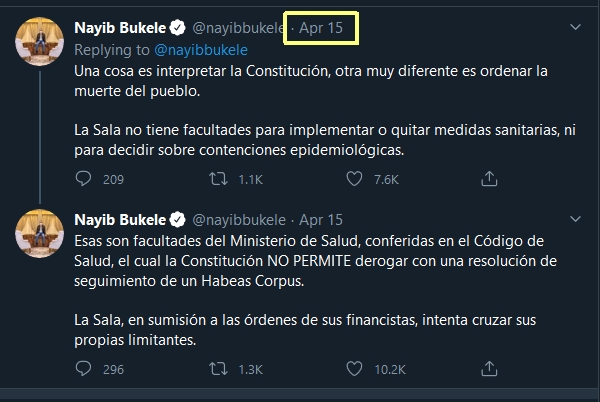
Read more: Is El Salvador’s Bukele Operating Above the Law?
Improving border security
The Salvadoran government continues to coordinate with DHS Immigration and Customs Enforcement (ICE) in facilitating the removal of Salvadoran nationals. Prior to the COVID-19 pandemic, the Salvadoran government received four flights per week with up to 135 passengers per flight. Despite adopting extraordinary measures to combat COVID-19, El Salvador continued to accept ICE removal flights. In July2019, the Salvadoran government committed to participate in a five-week pilot of ICE’s Electronic Nationality Verification Program (ENV), which expedites the removal of Salvadorans with final removal orders from the United States. El Salvador committed to continue participating in the ENV after the conclusion of the pilot.
Combating human smuggling and trafficking and countering the activities of criminal gangs, drug traffickers, and transnational criminal organizations
In January2020, the GOES (Salvadoran Government) was successful in reducing Salvadoran participation in a migrant caravan and thwarted another, while arresting and prosecuting the caravan organizers for the first time. In September 2019 the GOES successfully seized over $1 million in an operation that resulted in multiple arrests for human trafficking.
Informing its citizens of the dangers of the journey to the southwest border of the United States
President Bukele, Vice President Ulloa, and Foreign Minister Hill have repeatedly discouraged irregular migration and participation in migrant caravans in public remarks. Foreign Minister Hill has frequently and publicly urged Salvadorans to refrain from irregular migration to prevent further tragedies. In January 2020, Foreign Minister Hill urged Salvadorans to not join caravans that were being organized and provided information that dissuaded most who had gathered in San Salvador from departing on the journey. The (Government)’s migration office also led a vibrant social media campaign aimed at dissuading would-be irregular migrants, including a well-received video highlighting the perils of the journey.
It seems we cannot deny the Salvadoran Government’s work on migration. It seems it is indeed meeting the most important criteria. Everything else can wait.


